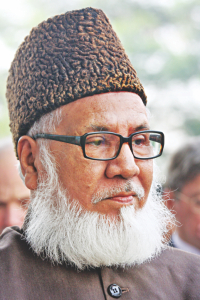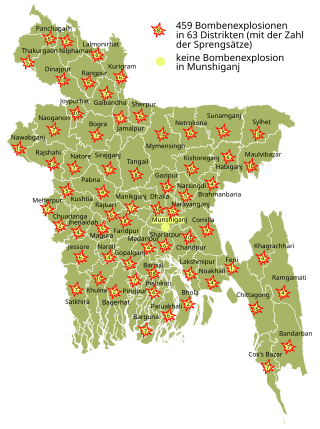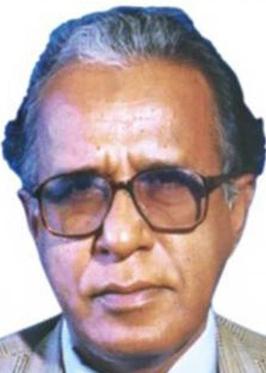Related Research Articles

Siddique ul-Islam, known popularly as Bangla Bhai, also known as Jawad uddin attariAzizur Rôhman, was a Bangladeshi terrorist and the military commander of the Al Qaeda affiliated radical Islamist organization Jagrata Muslim Janata Bangladesh, known in popular usage as the JMJB. Most active in the north-western section of Bangladesh around the Rajshahi region, Bangla Bhai gained a nationwide and worldwide notoriety for bombings and other terrorist activities.
Shaykh Abdur Rahman, also known as Abdur Rahman Shaykh, was the leader and the administrative head of the banned terrorist organization Jagrata Muslim Janata Bangladesh.
On 17 August 2005, around 500 bomb explosions occurred at 300 locations in 63 out of the 64 districts of Bangladesh. The bombs exploded within a half-hour period starting from 11:30 am. A terrorist organization, Jama'atul Mujahideen Bangladesh (JMB) claimed responsibility for the bombings. The group, led by Shaykh Abdur Rahman and Siddiqur Rahman. Another terrorist group, named Harkat-ul-Jihad al-Islami, was associated with JMB in executing the co-ordinated attack. Following the bombings, both groups were banned by the BNP Government of Bangladesh.

Motiur Rahman Nizami was a politician, former Minister of Bangladesh, Islamic scholar, writer, and the former leader of the Bangladesh Jamaat-e-Islami. He is noted for leading the terror squad Al-Badr during the Bangladesh Liberation War. On 29 October 2014, he was convicted of masterminding the Demra massacre by the International Crimes Tribunal of Bangladesh. Nizami was the Member of Parliament for the Pabna-1 constituency from 1991 to 1996 and again from 2001 to 2006. He also served as the Bangladeshi Minister of Agriculture and Minister of Industry.

Jamaat-ul-Mujahideen is a terrorist organisation operating in Bangladesh. It is listed as a terror group by Bangladesh, India, Malaysia and the United Kingdom. It was founded in April 1998 in Palampur in Dhaka Division by Abdur Rahman and gained public prominence in 2001 when bombs and documents detailing the activities of the organisation were discovered in Parbatipur in Dinajpur district. The organisation was officially declared a terrorist organisation and banned by the government of Bangladesh in February 2005 after attacks on NGOs. But it struck back in mid-August when it detonated 500 small bombs at 300 locations throughout Bangladesh. The group re-organised and has committed several public murders in 2016 in northern Bangladesh as part of a wave of attacks on secularists.
2005 (MMV) was a common year starting on Saturday of the Gregorian calendar, the 2005th year of the Common Era (CE) and Anno Domini (AD) designations, the 5th year of the 3rd millennium and the 21st century, and the 6th year of the 2000s decade.

Bangladesh Jamaat-e-Islami, previously known as Jamaat-e-Islami Bangladesh, or Jamaat for short, is the largest Islamist political party in Bangladesh. On 1 August 2013, the Bangladesh Supreme Court cancelled the registration of the Jamaat-e-Islami, ruling that the party is unfit to contest national elections.

On 5 February 2013, protests began in Shahbag, Bangladesh, following demands for the execution of Abdul Quader Mollah, who had been sentenced to life imprisonment and convicted on five of six counts of war crimes by the International Crimes Tribunal of Bangladesh. Later demands included banning the Bangladesh Jamaat-e-Islami party from politics including election and a boycott of institutions supporting the party.

The movement demanding trial of war criminals is a protest movement in Bangladesh, from 1972 to present demanding trial of the perpetrators of 1971 Bangladesh genocide during the Bangladesh Liberation War from Pakistan.

Bangladesh has experienced terrorism in the past conducted by a number of different organizations. In the past, both ISIL and other terrorist organizations had claimed to be active in the country however, the Bangladeshi government believes that they mainly operated through local affiliates, before being neutralised by security forces.
Attacks by Fundamentalist in Bangladesh refers to a period of turbulence in Bangladesh between 2013 and 2016 where attacks on a number of secularist and atheist writers, bloggers, and publishers in Bangladesh; foreigners; homosexuals; and religious minorities such as Hindus, Buddhists, Christians and Ahmadis were seen as having attacked Islam and the Prophet Muhammad with many killed by Muslim extremists in retaliation. By 2 July 2016 a total of 48 people, including 20 foreign nationals, were killed in such attacks. These attacks were largely blamed on extremist groups such as Ansarullah Bangla Team and Islamic State of Iraq and Syria. The Bangladeshi government was criticized for its response to the attacks, which included charging and jailing some of the secularist bloggers for allegedly defaming some religious groups; or hurting the religious sentiments of different religious groups; or urging the bloggers to flee overseas. This strategy was seen by some as pandering to hard line elements within Bangladesh's Muslim majority population. About 89% of the population in Bangladesh is Sunni Muslim. The government's eventual crackdown in June 2016 was also criticized for its heavy-handedness, as more than 11,000 people were arrested in a little more than a week.
Gulzar Uddin Ahmed, also known as Colonel Gulzar Ahmed, was the founding director of the intelligence wing and also served Additional Director General of Rapid Action Battalion. Until his death, he was a Colonel of the Bangladesh Army and also Sector Commander and Deputy Director General of Bangladesh Rifles.
2005 Jhalakathi bombing was a bombing of a car transporting judges to the District Court of Jhalakathi. Jama'atul Mujahideen Bangladesh (JMB) claimed responsibility for the bombings. The group, led by Shaykh Abdur Rahman and Siddiqur Rahman.

Aminul Haque was a Bangladesh Nationalist Party politician who served as the Bangladesh Minister of Post and Telecommunications. A member of the Bangladesh Nationalist Party (BNP), he represented Rajshahi-1 as a member of parliament from 1991 to 2006.

Govt. Madrasah-e-Alia is a government madrasa located in Bakshibazar, Dhaka, Bangladesh. Since its founding the madrasah has been playing a significant role in imparting and spreading Islamic education and ideology that is conservative, methodical, modern and progressive.
The 2005 Netrokona bombing was a suicide bomb attack on 8 December 2005 in Netrokona, Bangladesh that resulted in the deaths of eight people. It took place mid-morning outside the offices of Bangladesh Udichi Shilpigoshthi, a secular cultural organisation.
Mohammad Yunus was a Bangladeshi academic and Professor of economics at the University of Rajshahi. He was assassinated on 24 December 2004 by the Islamist terrorist organization Jamatul Mujahideen Bangladesh. He was one of four professors assassinated at Rajshahi University.
Nadim Mostafa is a Bangladesh Nationalist Party politician and the former Member of Parliament of Rajshahi-4. He was a close associate of Tarique Rahman, son of Ziaur Rahman and Khaleda Zia.
International Majlis-e Tahaffuz-e-Khatm-e Nobuwat Bangladesh is a right wing Islamist organization in Bangladesh that seeks to ban Ahmadiyya faith in the country.
Siddiqur Rahman Miah is a retired Justice of the High Court Division of the Bangladesh Supreme Court and former President of Dhaka Stock Exchange. He is the chairman of the AB Bank's Shariah Supervisory Committee. He is a director of Dhaka Stock Exchange.
References
- ↑ "37 militants among 3,192 arrested on first day of anti-terror crackdown: Police". bdnews24.com. Retrieved 30 September 2016.
- ↑ "A Rule of Law Meltdown Is Behind the Murder of Bloggers in Bangladesh". www.worldpoliticsreview.com. Retrieved 30 September 2016.
- ↑ (Direct), Nestle – Corporate Campaign. "The inspiring projects that are changing girls' education in India today" . Retrieved 30 September 2016.
- ↑ "Govt to keep watch on pro-Jamaat Peace schools". The Daily Star. 23 May 2016. Retrieved 30 September 2016.
- ↑ "Salafi ideology behind JMB's rise". Prothom Alo. Archived from the original on 12 October 2016. Retrieved 30 September 2016.
- ↑ "Is Bangladesh winning against extremism?". BBC News. Retrieved 30 September 2016.
- ↑ "'Suicide bombing' in Rajshahi mosque during Juma prayers kills 1". bdnews24.com. Retrieved 30 September 2016.
- 1 2 "Jagrata Muslim Janata Bangladesh (JMJB), South Asia Terrorism Portal". www.satp.org. Retrieved 30 September 2016.
- ↑ "Bangla Bhai's deputy Khamaru arrested again". Dhaka Tribune. 26 September 2016. Retrieved 30 September 2016.
- ↑ "Khamaru held again". The Daily Star. 26 September 2016. Retrieved 30 September 2016.
- ↑ "Ansarullah sixth outlawed militant group". Dhaka Tribune. Archived from the original on 2 October 2016. Retrieved 30 September 2016.
- ↑ "43 detained as drive against militants on". The Daily Star. 28 July 2016. Retrieved 30 September 2016.
- ↑ Top Bangladesh militant captured: police Archived 31 March 2007 at the Wayback Machine , Reuters news report, 6 March 2006.
- ↑ "Six JMB militants hanged". The Daily Star. Retrieved 30 September 2016.
- ↑ Manik, Julfikar Ali; Islam, Shariful. "Six JMB militants hanged". The Daily Star. Retrieved 30 September 2016.